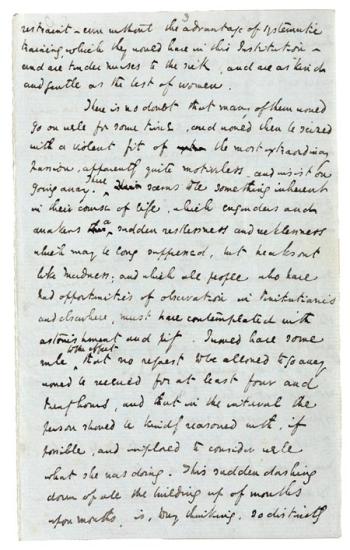
Autograph letter signed, London, 26 May 1846, to Angela Burdett-Coutts
Purchased with the assistance of the Fellows, 1951
This letter is the earliest in which Dickens makes reference to the project to create a home for prostitutes and petty miscreants that would become Urania Cottage. Dickens's fourteen-page letter sets out in detail his hopes and plans for the institution: "A woman or girl coming to the Asylum, it is explained to her that she has come there for useful repentance and reform, and because her past way of life has been dreadful in its nature and consequences, and full of affliction, misery, and despair to herself. Never mind Society while she is at that pass. Society has used her ill and turned away from her, and she cannot be expected to take much heed of its rights or wrongs." Dickens never used the term prostitute in any of his letters.
Philanthropy
From 1840 Dickens guided the charitable work of philanthropist Angela Burdett-Coutts (1814–1906), the wealthiest heiress in Victorian Britain. Dickens served as her official almoner and helped to assess the merits of the thousands of letters she received from those seeking financial assistance. He also advised on her plan for improved sanitation in the slums of Westminster and drew her attention and support to the Ragged School Union, which provided education to London's poorest children. A pragmatist, Dickens encouraged Burdett-Coutts to direct her philanthropy toward the causes of distress. In 1847 they founded a home, Urania Cottage, in Shepherd's Bush, as a shelter for homeless women—prostitutes or petty criminals who sought to rehabilitate themselves by learning practical skills and developing self-discipline. Many of the women were assisted to eventually emigrate to one of Britain's colonies to begin a new life. For more than ten years, Dickens administered Urania Cottage on behalf of Burdett-Coutts and played an extremely active role in its day-to-day management.
restraint—even without the advantage of systematic training, which they would have in this Institution—and are tender nurses to the sick, and are as kind and gentle as the best of women.
There is no doubt that many of them would go on well for some time, and would then be seized with a violent fit of the most extraordinary passion, apparently quite motiveless, and insist on going away. There seems to be something inherent in their course of life, which engenders and awakens a sudden restlessness and recklessness which may be long suppressed, but breaks out like Madness; and which all people who have had opportunities of observation in Penitentiaries and elsewhere, must have contemplated with astonishment and pity. I would have some rule to the effect that no request to be allowed to go away would be received for at least four and twenty hours, and that in the interval the person should be kindly reasoned with, if possible, and implored to consider well what she was doing. This sudden dashing down of all the building up of months upon months, is, to my thinking, so distinctly
